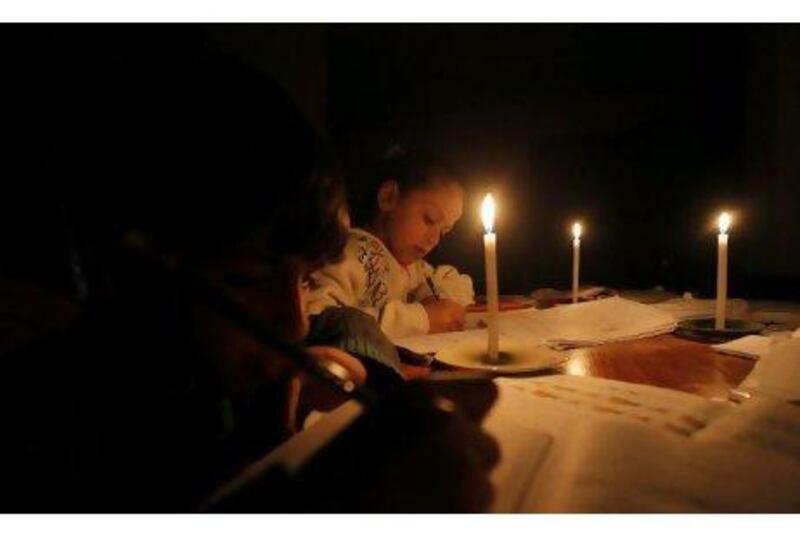JERUSALEM // Fuel tanks in petrol stations are empty; ambulance, taxi and bus services are grinding to a halt; and schoolchildren are doing homework by candlelight as Gaza endures daily power cuts of 18 hours or more.
Supplies of fuel for generators, a popular alternative to the unreliable power grid, have dried up, so restaurants cannot cook, hospitals cannot deliver medical services and pumps cannot draw water from wells.
Angry Gazans are directing their ire at the enclave's Hamas rulers, and observers say the Islamist group has dithered in finding a solution to the fuel crisis because it would require unpalatable compromises - not only with the rival Palestinian Authority in the West Bank, but with Israel too.
"This problem has seriously affected Hamas and its credibility among the people," said Walid Al Mudallal, political science professor at the Islamic University of Gaza. That's because people believe the problem is not a shortage of fuel, but rather a Hamas dilemma over where to obtain it.
Until early last year, Hamas relied on fuel delivered through Israel. That was a difficult arrangement. After Hamas took control in 2007, Israel imposed a blockade that denied Gazans access to basic goods and sufficient construction materials. It was loosened in 2010, but only slightly.
Israel allowed 2.2 million litres of fuel a week into Gaza for its sole power plant, according to the United Nations Office for the Coordination of Humanitarian Affairs (OCHA).
Not only was that inadequate for Gaza's needs, forcing rolling power blackouts, it was also expensive.
Hamas's solution was to turn to the smuggling tunnels between Gaza and Egypt for fuel supplies. The tunnels have become the lifeblood of Gaza's economy under the Israeli blockade.
Moving to black-market imports of Egyptian-subsidised fuel reduced the price of a litre of diesel from about US$1.85 (Dh6.8) to as little as $0.67.
This not only softened the financial burden on Gaza's 1.7 million Palestinians, but it provided Hamas with a degree of independence from Israel. The group even managed to profit from the black-market arrangement, slapping its own taxes on diesel and petrol sales.
In February, Egypt began preventing the transfer of fuel through the tunnels. The shortages were soon felt.
"How am I supposed to read by candlelight? How will I do well in my exams?" said Lisa Masharawi, a teenage student in Gaza city.
Lack of electricity has prevented fresh water being pumped to homes: more than 40 per cent of them have access to fresh water only once every four days, according to OCHA.
There is no diesel left to run Gaza's power plant, and pollution levels are rising because sewage-treatment facilities are not working. The UN body says about 80 million litres of effluent are released into the ocean every day.
But Egypt has not relented on its crackdown on fuel smuggling. Nor has it acquiesced to a long-standing Hamas demand that it open its sole border crossing with Gaza to trade.
Talal Okal, a political analyst in Gaza, said Egypt was blocking the smuggled fuel because it needed the fuel to satisfy its own demands. More important, he said, was Egypt's fear of being seen taking responsibility of Gaza and its problems. That was technically the responsibility of Israel.
"Hamas is trying to depend more on Egyptian resources, and at the same time, the Israelis are trying to push the Gaza Strip towards Egypt," he said.
But Egypt, he added, "does not want this" even though the Muslim Brotherhood, allies of Hamas, gained political power there. They have too many of their own problems, Mr Okal said.
He and others say Hamas will probably have to rely again on fuel brought in through Israel, but Hamas seems to be avoiding this.
The Islamist group this month accused the Palestinian Authority of collaborating with Israel's Mossad spy agency after it arranged with Israel and Egypt a delivery of diesel for Gaza. It held demonstrations on the border with Egypt. Then it arrested dozens of taxi drivers for spreading "rumours" about the crisis.
But, eventually, Mr Okal said: "Hamas are responsible for this problem and I don't think they have a choice but to solve it with a deal with the PA" - and, indirectly, Israel.
* With additional reporting by Agence France-Presse and the Associated Press






